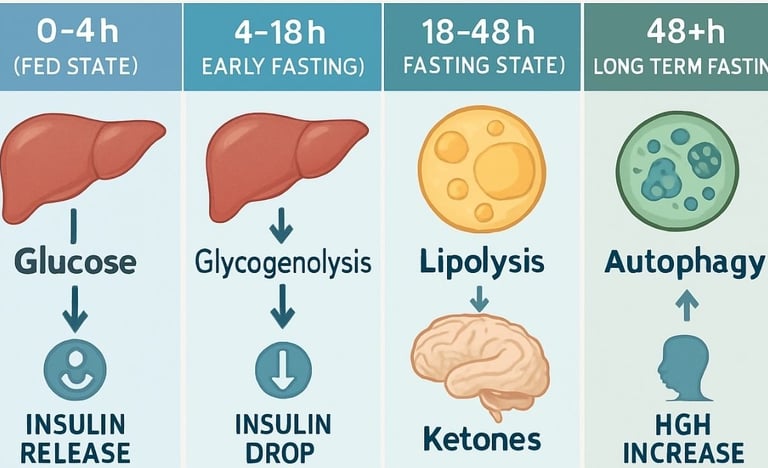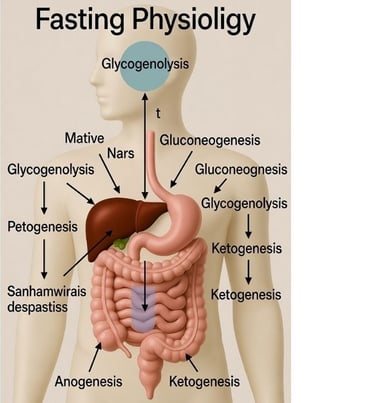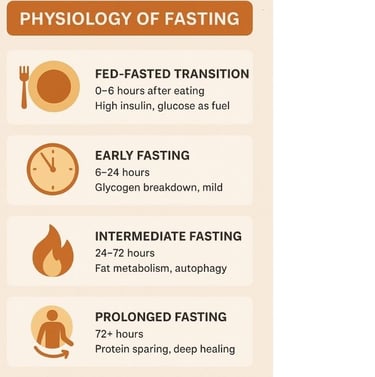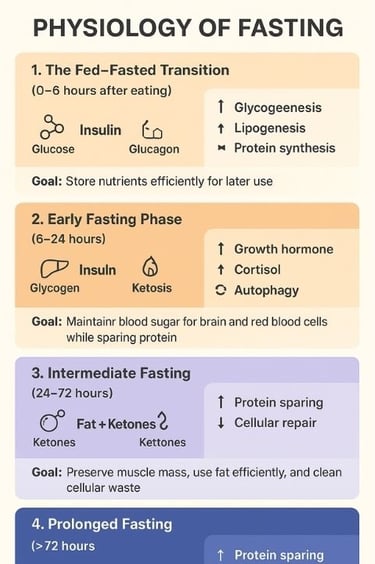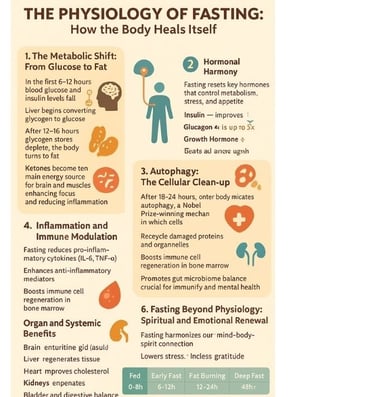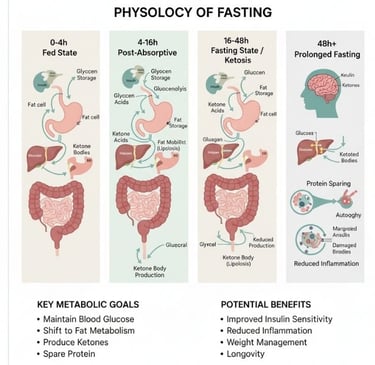
Health is a crown on the heads of the healthy that only the sick can see.
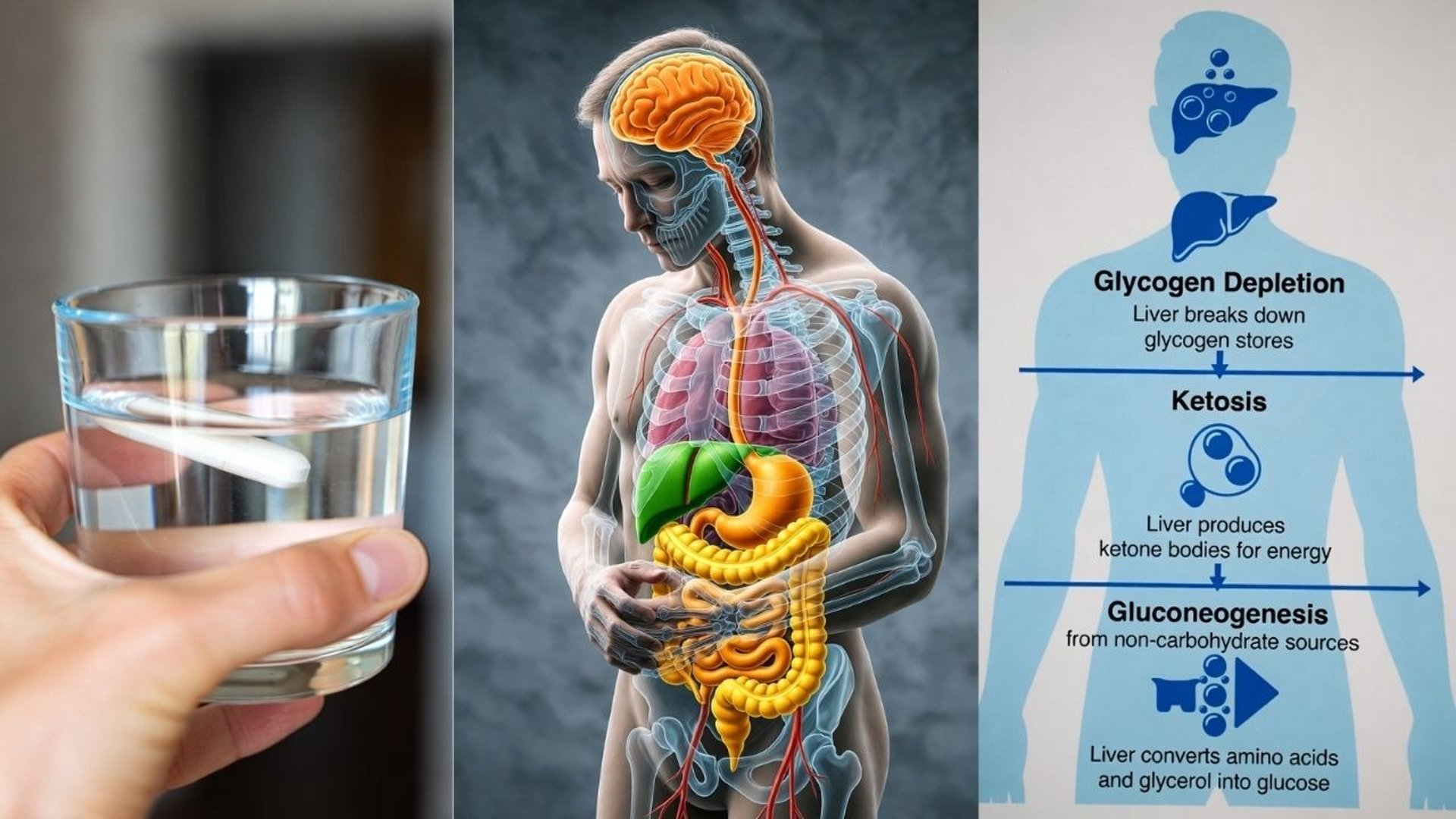
🔬 The Physiology of Fasting : The Biological Magic of Hunger, Renewal, and Reset
🌙✨ When hunger becomes healing — discover how fasting transforms metabolism, awakens cellular intelligence, and restores inner balance. 🌿
FASTINGDIABETESGASTRENESTAL
Dr Hassan Al warraqi
11/12/202515 min read


🔬 The Physiology of Fasting : The Biological Magic of Hunger, Renewal, and Reset
🧠Explore the physiology of fasting and uncover the biological magic of hunger — how every fasting hour renews cells, burns fat, resets hormones, and heals from within. Learn how Dr. Hassan Alwarraqi’s H-K-E-M framework unites science and spirituality to restore balance and freedom through fasting.
Fasting, a practice dating back ages and now supported by science, starts major body changes.
When you understand how fasting works, you see how not eating for certain times can greatly impact how your body uses energy, how your cells work, and your overall health.
What Happens to Your Body When You Fast: The Four Stages
During a fast, your body goes through different stages, each with its own set of processes:
The Fed State (0-4 Hours After Eating)
Right after you eat, your body is busy breaking down and using the food you just ate.
Your blood sugar goes up, which tells your body to release insulin. Insulin helps move this sugar into your cells for energy.
Any extra sugar gets stored as glycogen in your liver and muscles.
If there's even more sugar than that, it gets turned into fat.
The Early Fasting State (4-18 Hours After Eating)
As your blood sugar drops, your body starts using its stored sugar (glycogen) to keep your blood sugar steady.
Insulin levels go down, and another hormone called glucagon goes up.
Glucagon tells your liver to release stored sugar into your blood.
Your body starts to shift from building things up to breaking them down, and it starts burning fat more and more.
The Fasting State (18-48 Hours After Eating)
After about a day, your glycogen stores are used up.
This is when your body makes a big switch, going from using sugar to using fat as its main fuel source.
Your liver starts turning fatty acids into ketones. Ketones are an efficient energy source for your brain and muscles.
Many people find they have better mental clarity and steady energy levels during this stage.
Long-Term Fasting (48+ Hours)
After two days, you enter a deeper state where ketone levels are way up.
This kicks off a process called autophagy, where your cells clean out damaged parts.
Your body also releases a lot more growth hormone, which helps protect your muscles and keeps you burning fat.
Your body gets really good at using protein wisely, so you don't lose muscle.
How Fasting Changes Your Cells and Metabolism
Autophag : Cleaning and Repairing Your Cells
One of the best things about fasting is that it starts autophagy.
This is like your cells doing a deep clean, breaking down and recycling damaged parts.
Research shows that autophagy really kicks in after a day or two of fasting, which can:
Make your cells stronger and live longer
Get rid of damaged cell parts and proteins
Lower stress and swelling inside your body
Help protect against diseases related to aging
The Metabolic Switch: From Sugar to Ketones
The switch from using sugar to using fat for fuel is key to how fasting works.
This usually happens between 12 and 36 hours after your last meal, but it depends on things like:
How much glycogen you had stored
How active you are
How well your body adapts to different fuels
What your diet was like before
Ketones can provide most of your brain's energy during longer fasts.
This is something that helped our ancestors survive when food was scarce.
Hormone Changes During Fasting
Fasting causes a series of hormone changes that control how your body uses energy:
Insulin and Glucagon Balance
Insulin drops, which tells your fat cells to release stored energy.
Glucagon rises, which helps your body make sugar and burn fat.
This change in the insulin-to-glucagon balance is what drives the fasted state.
Growth Hormone Surge
Growth hormone levels go up a lot during fasting (studies show they can increase five fold).
This helps burn fat and protect muscle.
It's controlled by ghrelin, the hormone that makes you feel hungry.
Cortisol Elevation
Cortisol goes up a bit to help make sugar and keep your blood sugar stable.
It also helps burn fat.
This is a good response, not a sign of stress.
Thyroid Hormone Adaptation
T3 (the active thyroid hormone) goes down.
Reverse T3 goes up.
This slows down your metabolism and saves energy during long fasts.
How Your Body Uses Protein During Long Fasts
How your body uses protein is important to understand when fasting:
Phase I (Initial Phase)
Your body uses amino acids to make sugar.
Protein use goes down as your body gets used to fasting.
Phase II (Protein-Sparing Phase)
Your body breaks down very little protein.
Ketone levels go up a lot.
You lose less muscle and have lower uric acid levels.
This is the ideal state for long fasts.
Phase III (Starvation Phase)
This happens when your fat stores are used up.
Protein breakdown goes up a lot.
Ketone levels drop.
You lose more muscle and have higher uric acid levels.
This is a sign you need to stop fasting to avoid muscle loss.
How Fasting Affects Your Kidneys
Fasting affects how your kidneys work by controlling water balance:
Aquaporin-2 (AQP2) Downregulation
This starts within a day of fasting.
It reduces how much water your kidneys reabsorb.
This leads to more pee, even though you're drinking less.
Your pee becomes more diluted.
What This Means for Your Urinary Health
You might pee more often and feel more urgency.
However, the diluted urine might irritate your bladder less.
Drink enough water when you're eating.
Keep your electrolytes balanced during long fasts.
How Fasting Changes Your Cells
Sirtuin Activation and Longevity Pathways
Fasting increases sirtuins (SIRT1 and SIRT3), which are proteins that help with:
SIRT1: Lowering sugar production during short fasts; burning fat during long fasts..
SIRT3: Burning fat and making ketones.
Both affect aging, swelling, how your body uses energy and how you respond to insulin.
Mitochondrial Biogenesis
Fasting helps create new mitochondria, the power houses of your cells, which can improve:
How well your body uses energy
How much energy you can produce
How strong your cells are
Gene Expression Changes
Fasting changes which genes are turned on or off, affecting:
Longevity and stress resistance
AMPK activation (a sensor of cell energy)
mTOR inhibition (a growth pathway)
DNA repair
Health Benefits of Fasting
Metabolic Health Improvements
Better Insulin Sensitivity
Insulin levels drop a lot during fasting.
Your cells respond better to insulin after you start eating again.
This lowers your risk of type 2 diabetes.
Your blood sugar is better controlled.
Weight Management
You keep more muscle compared to just cutting calories.
You burn more fat.
Your metabolism stays up (short-term fasting doesn't really slow it down).
Norepinephrine increases energy use.
Heart Benefits
Research suggests fasting may improve:
Blood pressure
Cholesterol levels (lower LDL, higher HDL)
Swelling (lower C-reactive protein, IL-6, TNF-alpha)
How well your blood vessels work
Brain Health
Better Cognitive Function
Your brain produces more BDNF (brain-derived neurotrophic factor).
Your brain cells are healthier and more adaptable.
Your mitochondria work better in brain cells.
Ketones are a great fuel for brain tissue.
Norepinephrine increases mental alertness.
Neuroprotection
Fasting may lower your risk of brain diseases.
It can improve brain function during fasting periods.
It can improve your mood through hormone balance.
Anti-Swelling Effects
Fasting lowers chronic swelling by:
Lowering NF-κB pathway activity
Activating Nrf2 pathways (which fight damage)
Lowering the production of chemicals that cause swelling
Improving your gut and the bacteria in it
Better Gut Health
Fasting has a good effect on your gut by:
Improving the types of bacteria in your gut
Reducing leaky gut
Giving your gut a rest
Changing hormone balance through gut bacteria
Physical Performance During Fasting
What You Can Still Do
You can maintain grip strength for up to two weeks.
You can still do anaerobic exercises.
You can still handle fight or flight situations.
What Might Be Harder
Endurance might decrease after a day or two.
Balance and coordination might be affected.
You might need to lower the intensity of your workouts.
Different Fasting Plans
Time-Restricted Feeding (TRF)
You eat within a 4-10 hour window each day.
It has small effects on your kidneys.
It's easier to stick to in the long run.
It affects your body clock.
Intermittent Fasting (IF)
You alternate between fasting and eating days (5:2, alternate-day fasting).
It moderately switches your metabolism.
It activates autophagy in a balanced way.
It's sustainable for many people.
Fasting-Mimicking Diet (FMD)
You eat very few calories for five days in a row.
It starts the same processes as fasting, but you get minimal nutrients.
It might be easier to handle than complete fasting.
It's being studied for its health benefits.
Prolonged Fasting (48-120 hours)
This leads to deep ketosis and a lot of autophagy.
It lowers IGF-1/PKA signals.
It increases stress resistance.
You need medical supervision.
How People React Differently to Fasting
How your body responds to fasting depends on:
Metabolic flexibility: How quickly you adapt depends on your past diet.
Body composition: The amount of muscle vs. fat affects fuel availability.
Activity level: How active you are affects glycogen use.
Genetics: You might have different versions of genes that affect metabolism and hormones.
Health status: Existing conditions can change how you respond to fasting.
Safety and When to Avoid Fasting
When to Avoid Fasting
Pregnancy and breastfeeding
History of eating disorders
Type 1 diabetes (needs strict medical supervision)
Certain medications that need to be taken with food
Being underweight or malnourished
Children and teenagers
When to Get Medical Advice
Long fasts longer than two or three days
Pre-existing health conditions
Taking medication
Fasting for the first time if you're over 65
What to Do When You Start Eating Again
Follow a proper refeeding plan after long fasts.
There's a risk of refeeding syndrome (electrolyte imbalances).
Introduce food slowly.
Focus on healthy, balanced meals.
Tips for Fasting
Hydration
Drink enough water during fasting periods.
Spread your water intake evenly during eating windows.
Check your urine color (pale yellow means you're hydrated).
Electrolyte Management
Take sodium, potassium, and magnesium if you're doing long fasts.
Your kidneys will get rid of more sodium, so you need to replace it.
This prevents muscle cramps, tiredness, and headaches.
Activity
Light to moderate exercise is usually fine.
Intense endurance training might be harder.
Do strength training during eating windows or shortly after.
Sleep
Fasting can affect sleep.
Keep your body clock in sync.
Time your last meal properly before sleep.
Conclusion
Fasting and Your Body
Fasting shows how well our bodies can adapt.
From using up glycogen to switching to fat, entering ketosis, and activating autophagy, fasting starts changes that helped us survive throughout history.
Research continues to show that fasting can improve metabolic health, help with weight management, reduce swelling, and potentially increase lifespan.
However, everyone responds differently to fasting, so what works for one person might not work for another.
Checking your ketone levels can help you know if you've successfully switched to burning fat.
As with any big diet change, talk to your doctor before starting fasting, especially long fasts, to make sure it's safe for you.
Fasting is a tool that can help you improve your health, renew your cells, and potentially live longer.
When you understand how it works, you can make better decisions about whether to include it in your health plan.
Medical Disclaimer : This information is for educational purposes only and shouldn't replace advice from a doctor.
Always talk to a healthcare provider before starting any fasting plan, especially if you have health problems or take medications.
Frequently asked FAQS Questions About Fasting
Let's talk about fasting. Here are some answers to things people often wonder about.
Fasting Basics
What's fasting, exactly?
Fasting means you purposely don't eat (and sometimes don't drink anything but water) for a certain time.
This could be a short 12-hour overnight stretch or a longer fast that lasts several days.
When you fast, some interesting things start happening in your body.
It starts switching from using the food you just ate to using its stored energy.
How long until I'm actually fasting?
You're not instantly in fasting mode the second you stop eating.
It takes about 4 to 6 hours after your last meal for your body to finish digesting everything.
But the real change, where your body flips from using sugar to burning fat for fuel, normally takes between 12 and 36 hours.
This delay depends on how much stored sugar you have, how active you are, and how well your metabolism adapts.
What's this metabolic switch you keep talking about?
Think of the metabolic switch as your body's fuel source changing gears.
Usually, your body runs on glucose (sugar).
But when you fast, it switches to using fatty acids and ketones.
This change is key to understanding how fasting works.
This usually kicks in when your sugar stores are used up, which happens after about 18 to 24 hours.
Fasting vs. Starving
Are they the same?
No, they're not the same.
Fasting is a planned break from eating, and your body has stored fat to burn for energy.
Starvation, on the other hand, happens when your body runs out of fat and starts breaking down muscle and organs to stay alive.
If you plan it right, fasting can be safe and avoid starvation.
How Fasting Changes Your Body
What happens to my blood sugar when I fast?
Your blood sugar drops at first, but your body is pretty smart.
Your liver steps in and starts making new sugar from other sources, like amino acids and glycerol.
This process is called gluconeogenesis.
Your body tries hard to keep your blood sugar stable, as some cells (like red blood cells and parts of your brain) rely on it.
What are ketones? When do they show up?
Ketones are fuel molecules made from fat in your liver when you fast.
They're like a backup energy source, especially for your brain.
Ketone production really gets going after 18 to 24 hours and can become way higher than normal if you fast for longer.
Will fasting wreck my metabolism?
Most of the time, no.
Short fasts (up to 2 or 3 days) typically don't slow down your metabolism.
It might even speed up a little because of increased norepinephrine.
A slow metabolism usually happens with really restricted diets or long fasts lasting several days, as your body tries to save energy.
How does my body protect my muscles when I'm not eating?
Your body has a few tricks to spare muscle:
* Growth hormone boost: This goes up a lot, which helps protect muscle.
* Ketones: By using ketones, your brain needs less sugar, so your body doesn't have to break down as much protein for glucose.
* Metabolic change: After a couple of days, your body gets better at using fat for fuel, so it breaks down even less protein.
Hormone Changes
How does fasting change my insulin?
Your insulin levels drop a lot when you fast.
It's one of the biggest hormone changes.
This drop tells your fat cells to release stored energy and can make your body more sensitive to insulin.
Lower insulin is linked to a lower chance of diabetes and a healthier metabolism.
Why does growth hormone go up when I fast?
Growth hormone increases when you fast, controlled by ghrelin.
This boost helps you keep your muscle and burn fat.
Studies show it can go up a lot during fasting.
What happens with cortisol when I fast?
Cortisol goes up a bit to help keep your blood sugar stable and triggers fat burning.
This isn't a bad thing; it's just your body adapting. If you aren't stressed, your cortisol should go back to normal.
How does fasting affect my thyroid?
Fasting usually leads to:
* Less T3 (active thyroid hormone): This reduces how much sugar your body releases and saves energy.
* More reverse T3: This is an inactive form that also helps conserve energy.
* These changes slow down your metabolism a bit to conserve energy.
Does fasting mess with testosterone?
This depends on how long you're fasting and your situation:
* Short fasts (like 16 hours every day for weeks, or 3 days in a row): Might lower testosterone in men.
* Restricting calories for a long time if you're obese: Could increase testosterone by helping your testicles work better and reducing the conversion of testosterone to estrogen.
* Everyone reacts differently, based on their body and health.
What's Happening in Your Cells
What's autophagy? When does it kick in?
Autophagy is like your cells' cleaning service.
They break down and recycle damaged parts.
It usually ramps up after a day or two of fasting and is at its best during longer fasts.
* How does fasting help autophagy?
Fasting helps autophagy in a few ways:
* Low insulin: Turns off growth signals.
* Reduced mTOR: Switches off growth mode.
* Activated AMPK: Acts like a cellular energy sensor and starts cleaning.
What are sirtuins? How does fasting affect them?
Sirtuins are proteins that control aging, swelling, and metabolism.
Fasting turns them up.
They help with things like using fat for fuel and keeping your metabolism efficient.
Does fasting make new mitochondria?
Yes, it can! This strengthens your cells and helps them resist stress.
Improved mitochondria contribute to the good effects of fasting.
Fasting and Peeing
Why am I going to the bathroom so much when I fast?
When you fast, your kidneys have trouble concentrating urine.
This makes you pee more, even if you're not drinking as much. It goes back to normal when you start eating again.
How does fasting affect bladder control?
It's tricky.
It can help some people, but it may not be so good for others:
* It might help if:
* Weight loss reduces pressure on your bladder.
* Better insulin sensitivity helps an overactive bladder.
* Less inflammation improves bladder function.
* It might not help if:
* You're peeing more anyway.
* You already have urgency issues.
* Electrolyte changes affect your bladder muscle.
Should I drink more water while fasting?
Yes! Staying hydrated is important.
Aim for pale yellow urine.
But don't chug tons of water at once. Space it out.
Different Ways to Fast
What is intermittent fasting (IF)?
It means you cycle between periods of eating and not eating.
Some forms are:
* 16:8: Fast for 16 hours, eat for 8.
* 5:2: Eat normally for 5 days, then really restrict calories for 2 days.
* Every-other-day fasting: Alternate between fasting and eating normally.
What is time-restricted feeding (TRF)?
It's like intermittent fasting, but you eat all your food within a certain time each day (like 4-10 hours).
It's often easier to stick with in the long run.
What's a fasting-mimicking diet (FMD)?
You eat very few calories (like 500-800) for 5 days to trick your body into thinking it's fasting while still fueling yourself.
How long should I fast for the best results?
It depends on what you want:
* 12-16 hours: Better insulin sensitivity, starts burning fat.
* 16-24 hours: Activates the metabolic switch, increases ketones.
* 24-48 hours: Major autophagy, deep ketosis, growth hormone boost.
* 48-72+ hours: Peak autophagy, good for your immune system, but you should have medical supervision.
Can I work out while I fast?
Yes, but keep a few things in mind:
* Easy workouts: Usually OK.
* Hard workouts: Might be tough after a day of fasting.
* Strength training: Ideally do it when you're eating or soon after.
* Endurance activities: Often get harder after a day or two of fasting.
Is Fasting Good For Me?
* Can fasting help me lose weight?
It can, by:
* Helping you eat less overall.
* Burning more fat.
* Preserving muscle better than regular dieting.
* Helping your body use insulin better.
Does fasting make my body better with insulin?
Yes. It helps your cells reset.
Can fasting lower swelling?
Many studies show that fasting can reduce many signs of swelling.
How does fasting affect my brain?
Fasting:
* Supports neuron health.
* Provides ketones for brain energy.
* Improves mental clarity and focus.
* Might protect against brain diseases.
* Can improve mood
Does fasting boost my protection from diseases?
It depends on how long you fast:
* Short fasts (a day or two): May temporarily boost protection.
* Long fasts (3+ days): Can help reset your immune system.
Can fasting help me live longer?
Studies suggest that fasting can increase lifespan.
Safety First
Who should NOT fast?
Don't fast if you are:
* Pregnant or breastfeeding
* A child or teenager
* Have an eating disorder
* Are underweight
* Have type 1 diabetes
* Taking required medications with food
* Have any health issues
What are some common side effects of fasting?
Can include:
* Hunger
* Headaches
* Tiredness
* Dizziness
* Crankiness
* Trouble concentrating
* Sleep changes
What is keto flu?
It's what happens when you switch to ketosis.
* Headache and tiredness
* Upset Stomach
* Muscle cramps
* Problems focusing
* Crankiness
Can I take vitamins while fasting?
It depends.
Consider checking labels for hidden calories or additives
What is refeeding syndrome?
A dangerous condition that can happen when you eat after a long fast.
How should I break a fast safely?
Start slowly and small with high nutrient foods.
Making Fasting Work For You
What can I have on a fast without breaking it?
Acceptable items:
* Water
* Black coffee
* Tea
* Electrolytes
* Apple Cider Vingar
How do I see if I'm in ketosis ?
Signs Include:
* Test Ketones
* Fruity breath
* Urine strips
* Increased energy, clear thinking, less hungry
How can I make fasting easier?
Start slow. Stay busy and hydrate.
Does hunger increase the longer I fast?
No it decreases around day 2.
How does fasting affect women differently than men?
Women responses:
* Hormone change
* Menstrual cycle
*Shorter periods are better.
Can I do intermittent fasting long-term?
Yes if its part of your lifestyle
Should I see a physician before fasting?
See a provider if:
* Have any health issues
* Take needed medications
* Plan for extended fasts
Can diabetics fast safely?
Requires medical supervision
How does fasting interact with medications?
Timing has to be coordinated
Can fasting affect my thyroid?
May have adverse effects if you have related medical issues
Is fasting safe for older adults?
Yes:
* Make sure short periods with medical supervision.
Reminder
This is educational.
Always ask a medical provider for more information
🌿 My Fasting Approach – The David-Style Pattern (by Dr. Hassan Alwarraqi, H-K-E-M)
My fasting method follows the David-style rhythm — fasting 3–4 days per week (Saturday, Monday, Wednesday, and Thursday) — inspired by Dr. Hassan Alwarraqi’s holistic medical framework (H-K-E-M).
This pattern, similar to alternate-day fasting, supports a powerful metabolic reset, enhances fat-based energy utilization, and activates cellular repair and rejuvenation mechanisms.
Fasting is not deprivation — it’s a therapeutic regimen that restores internal balance, corrects root causes of disease, and revitalizes the body from within. 🌙✨
============================================================================================================
🌙 Suitable Hashtags
#PhysiologyOfFasting #FastingScience #FastingBenefits #BiologicalRenewal #HungerHealing #MetabolicReset #CellularRepair #Autophagy #HolisticMedicine #NaturalHealing #MetabolicFreedom #FastingJourney #HealingFromWithin #DrHassanAlwarraqi #HKEM #FastingTherapy #MindBodyBalance #EnergyAndMetabolism #ScientificFasting #FastingWisdom
🧬 Excerpt (for article previews or social sharing)
Fasting is more than abstaining from food — it’s a biological symphony of renewal. From glycogen depletion to fat burning and cellular repair, the physiology of fasting reveals how hunger becomes medicine, guiding the body toward balance and regeneration.
👨⚕️ Author Bio
Dr. Hassan Alwarraqi, founder of H-K-E-M.com, integrates Healing, Knowledge, Energy, and Metabolism to restore natural harmony within the body. His work explores fasting, apitherapy, and holistic medicine as pathways to cellular renewal and lasting wellness.
🔬 The Physiology of Fasting: The Biological Magic of Hunger, Renewal, and Reset
https://www.h-k-e-m.com/-the-physiology-of-fasting-the-biological-magic-of-hunger-renewal-and-reset
🌙✨ When hunger becomes healing — discover how fasting transforms metabolism, awakens cellular intelligence, and restores inner balance. 🌿
Keywords: fasting physiology, hunger and renewal, metabolic reset, autophagy, Dr Hassan Alwarraqi, H-K-E-M, fasting benefits, cellular repair, holistic medicine, natural healing
============================================================================================================
#FastingHeals #MetabolicFreedom #DrHassanAlwarraqi #HKEM #FastingTherapy #NaturalHealing #CellularRenewal #HolisticMedicine #FastingJourney #MindBodyBalance #AlternateDayFasting #HealingFromWithin #FastingLifestyle #SpiritualHealing #RegainControl #MetabolicReset #HealthTransformation #InnerBalance #FastingWisdom #CleanseAndRenew
https://www.h-k-e-m.com/-break-free-from-the-drip-restoring-balance-through-fasting-
🧭 Break Free from the Drip : Restoring Balance Through Fasting 🌙🌿
============================================================================================================


